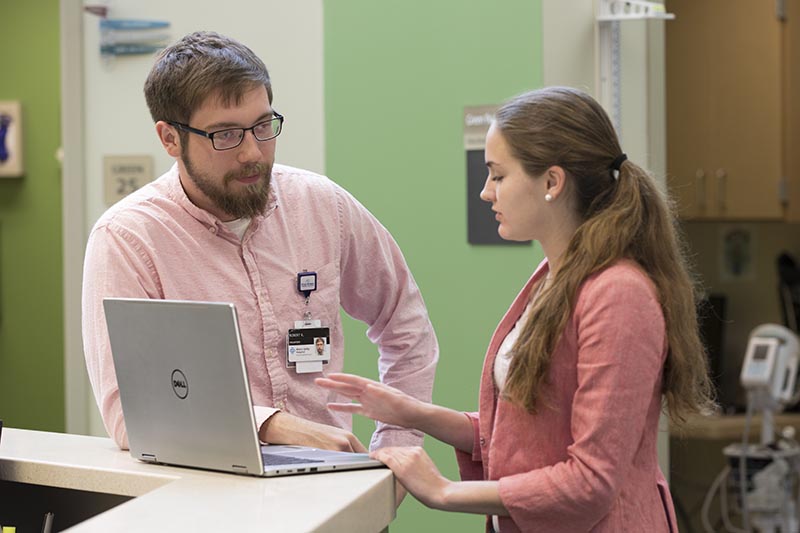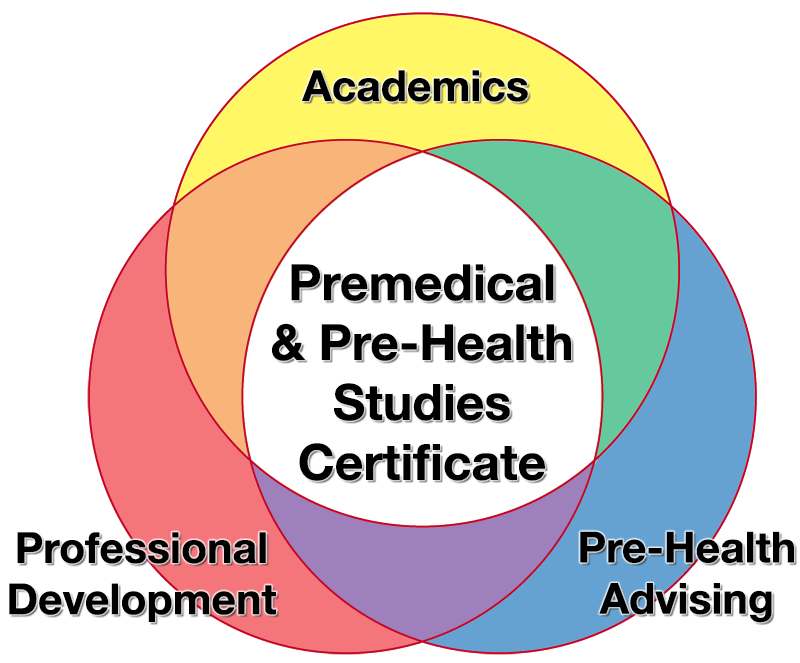
Post-Baccalaureate Premedical and Pre-Health Studies Certificate
 The Premedical and Pre-Health Studies Certificate is a post-baccalaureate program intended for students that have already completed a bachelor's degree, and yet need additional preparation to have a competitive application for medical school or other healthcare professional programs. It provides a broad-based premedical/pre-health background and prepares students to pursue advanced degrees in medicine as well as other healthcare-related fields. The certificate integrates comprehensive, regularly scheduled premedical advising with professional development courses and courses that cover fundamental concepts in the biological, physical, and social sciences required for admission into medical school or other health professional schools, and/or in preparation for standardized professional healthcare program admission tests (e.g., MCAT, DAT, GRE, PA-CAT).
The Premedical and Pre-Health Studies Certificate is a post-baccalaureate program intended for students that have already completed a bachelor's degree, and yet need additional preparation to have a competitive application for medical school or other healthcare professional programs. It provides a broad-based premedical/pre-health background and prepares students to pursue advanced degrees in medicine as well as other healthcare-related fields. The certificate integrates comprehensive, regularly scheduled premedical advising with professional development courses and courses that cover fundamental concepts in the biological, physical, and social sciences required for admission into medical school or other health professional schools, and/or in preparation for standardized professional healthcare program admission tests (e.g., MCAT, DAT, GRE, PA-CAT).
To earn the certificate, students would complete a minimum of 24 credit hours. However, because each student will enter with differing levels of aptitude and knowledge, the program design is highly flexible – with the average number of credits being 30. Students will work with a professional advisor to develop an individualized program. Depending on the students’ needs, the program could be completed in 1-2 years.
On a rolling basis, applicants are evaluated based on their previous academic record (3.2 GPA minimum), personal statement, evidence of math competency (standardized test scores such as the SAT or ACT and/or college-level math coursework), motivation, experience in medicine, and personal qualities.
Application Materials:
- Academic transcript and a minimum 3.2 G.P.A
- Two (2) letters of recommendation (academic or professional):
- These letters should be from individuals familiar with the applicant’s academic qualifications, work ethic, and leadership skills
- Evidence of math competency:
- Acceptable evidence includes any of the following:
- ACT math score
- SAT math score
- A list of math courses taken as an undergraduate
- Acceptable evidence includes any of the following:
- Personal Statement:
Biology
- BIO/MBI 116 - Biological Concepts: Structure, Function, Cellular, and Molecular Biology (4)
- BIO 201 - Human Anatomy (4)
- BIO 203 - Introduction to Cell Biology (3)
- BIO 305 - Human Physiology (4)
Chemistry
- General Chemistry:
- CHM 141/144 - College Chemistry/College Chemistry Lab (5)
and CHM 142/145 - College Chemistry/College Chemistry Lab (5)
- CHM 141/144 - College Chemistry/College Chemistry Lab (5)
- Organic Chemistry:
- CHM 241/244 - Organic Chemistry/Organic Chemistry Lab (5)
and CHM 242/245 - Organic Chemistry/Organic Chemistry Lab (5)
- CHM 241/244 - Organic Chemistry/Organic Chemistry Lab (5)
Biochemistry
- CHM 432 (preferred) - Fundamentals of Biochemistry (4)
OR - CHM 332 - Outlines of Biochemistry (3)
Physics
- PHY 161 - Physics for the Life Sciences with Laboratory I (4)
and PHY 162 - Physics for the Life Sciences with Laboratory II (4)
OR - PHY 191 - General Physics with Laboratory I (5)
and PHY 192 - General Physics with Laboratory II (5, calculus-based)
Statistics
- STA 261 - Statistics (4)
OR - STA 301 - Applied Statistics (3)
Professional Development
- PMD 301 - Navigating Healthcare Professional School Admissions (1 hour)
Biology
- BIO 342 – Genetics (3)
- BIO 361 – Patterns in Development (4)
- BIO 449 – Biology of Cancer (3)
- BIO 454 – Endocrinology (3)
- BIO 457 – Neuroanatomy (3)
- BIO 469 – Neurophysiology (3)
- MBI 201 – General Microbiology (4)
- MBI 361 – Fundamentals of Epidemiology (3)
- MBI 365 – Molecular and Cell Biology (3)
- MBI 405 – Medical Bacteriology (4)
- MBI 415 – Immunology Principles and Practice (4)
or MBI 414 – Immunology Principles (3) - MBI 464 – Human Viruses (3)
Social Sciences
- PSY 111/112 - Introduction to Psychology (4)
- SOC 153 - Sociology in a Global Context (3)
The certificate requires the completion of 24 credit hours of courses at Miami, with a 3.2 GPA.
If a student has already completed a core course, they do not have to take the course again. Also, if a student has already completed several core courses prior to entering the program such that they have fewer than 24 credit hours of core courses remaining, they may take elective courses to satisfy the required minimum of 24 credit hours.
Students may elect to repeat a course taken prior to entering the program for a variety of reasons. It may be that the student is not satisfied with their grade, or the course was taken several years ago. Those students considering this option should discuss this with their pre-health professions advisor.
Specialized advising:
In consultation with the advisor, students will develop the best program of study for their needs. Students may also take additional elective coursework with the advisor’s approval.
It’s important to remember that students often exceed the minimum requirements to position themselves as strong candidates. Meeting regularly with the Pre-Health Professions Advisor is encouraged.
Growth Year Assistance:
During the growth year (the year after finishing the certificate program in which one applies to and interviews for professional school), the Mallory-Wilson Center will continue to provide advising opportunities, including application review and mock interviews.
For some students, it may be beneficial to get involved in any combination of activities, including a master's degree, such as the 12-month Biomedical Science M.M.Sc. at Miami, that will enhance academic credentials and provide clinical opportunities. These activities may also include clinical exposure, research, or involvement in community service. Students in the certificate will be able to discuss these options during their individualized advising sessions.
Additional Considerations:
Opportunities for shadowing, volunteering, and research while completing the certificate can be explored with the Mallory-Wilson Center and program faculty.